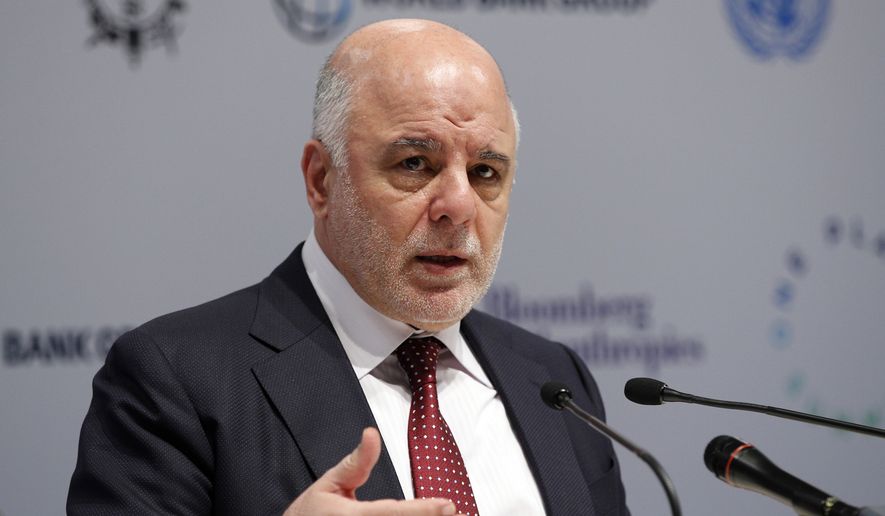Iranian-backed Shia paramilitaries who played a vital role in flushing the Islamic State from its strongholds in northern Iraq must follow the orders of Baghdad — not Tehran — says a top Iranian cleric, amid concerns the militias would act as Iran’s proxy force in Iraq.
The heads of the armed Shia groups, which constitute the majority of Iraq’s Popular Mobilization Forces (PMF), must also remain on the sidelines in Iraq’s political future where Prime Minister Haider al Abadi is fighting to keep his tenuous coalition government from splintering in a post-ISIS Iraq, Grand Ayatollah Ali al-Sistani said in a statement.
Iran’s top cleric on Friday refrained from calling for the dissolution of the PMFs, which some in Baghdad have advocated for, but did say the Shia militias must operate “within the legal framework that exclusively puts the arm under the command of the state.”
“It is necessary to protect this high status [of the PMF] and not to exploit it to achieve political goals that will eventually lead this sacred title to have the same fate as other such respected titles,” he added.
The political wings of the Shia-led Badr Organization, Asa’ib Ahl al-Haq — also known as the Khazali Network — and Kata’ib Hezbollah are reportedly rallying support among Iraq’s Shias to lock in seats in Iraq’s 2018 parliamentary elections. The armed factions of these groups have been accused of sectarian violence and extrajudicial killings of Iraqis during anti-ISIS operations in Fallujah.
Hadi al-Amiri, the head of the Badr organization that operates under the PMF, on Friday ordered his fighters to break ties with the group’s political faction if they wanted to remain part of the militia.
SEE ALSO: U.S. accuses Iran of being terrorist ‘arsonist’
Mr. Sistani’s call comes less than a week after Saraya Al-Salam, the paramilitary wing of influential Iraqi Shia cleric Muqtada al Sadr, agreed to disband its forces and hand over its cache of weapons to the Iraqi government. It was the first Shia militia and PMF member to lay down its arms in the aftermath of the Islamic State’s defeat in the country.
There are an estimated 140,000 registered fighters under the PMF banner in Iraq, according to military officials in Baghdad, which constitutes nearly half of the Iraqi army and a quarter of the security forces under the Interior Ministry. Mr. Abadi federalized the PMFs last year, making them an official member of the Iraqi Security Forces. But prominent Sunni Iraqi lawmakers have questioned the paramilitaries’ loyalty to the country.
Iraqi Vice President Osama al-Nujaifi, the top government official representing the country’s Sunni minority, openly questioned the loyalties of the Shia militias fighting as part of the PMFs.
“They have their own political aspirations, their own [political] agendas. … They are very dangerous to the future of Iraq,” Mr. Nujaifi said last month.
Concern of Iran’s expanding influence via proxy forces in Iraq, Syria, Yemen and elsewhere is drawing increasing scrutiny from Washington. U.S. Ambassador to the U.N. Nikki Haley offered reportedly “concrete evidence” Thursday of Iranian ties to a Yemeni missile attack against Saudi Arabia.
Fragments of the missile, fired at King Khalid International Airport in Riyadh early last month by Houthi rebels in Yemen, included inherent design features and markings clearly identifying the weapon’s Iranian origins.
“The evidence is undeniable. The weapons might as well have had ’Made in Iran’ stickers,” she said.
Iranian Foreign Minister Javad Zarif on social media Thursday drew comparisons between Mrs. Haley’s comments and those of former Secretary of State Colin Powell in 2003, making the case for weapons of mass destruction in Iraq.
“When I was based at the U.N., I saw this show and what it begat,” Mr. Zarif tweeted.
An Arab-military coalition spearheaded by Riyadh has been at war with Iranian-backed Houthi separatists since 2005. Washington has admittedly provided logistical and intelligence support to the Saudi-led coalition.
• Carlo Muñoz can be reached at cmunoz@washingtontimes.com.




Please read our comment policy before commenting.